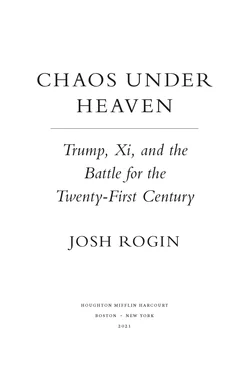Pentagon officials, upon hearing about this, were incensed. They determined that ASU had mixed together the resources and programs of their Confucius Institute program and their Pentagon-funded Flagship Chinese-language programs, which was not what the Pentagon had intended or wanted. The Pentagon worked with Congress to pass new legislation that required any university that had a Confucius Institute and a Pentagon language program to separate the two and then get a waiver from the Defense Department if they wanted to keep both on the same campus. But even though about a dozen schools applied for the waivers, zero were granted. ASU and about a dozen other schools closed their Confucius Institutes as a result.
Following the ASU revelations, members of Congress began to put pressure on universities in their districts to jettison their Confucius Institutes. In April 2019, GOP representative Jim Banks called the president of the University of Indiana and told him in no uncertain terms that if he didn’t shut down his Confucius Institute, Banks would personally make sure the school never got one more dime of Pentagon money. The university closed the institute later that day, midsemester.
The institutes mean big money, especially for smaller schools. In addition to paying millions for the actual programs, hosting a Confucius Institute gets any university into a special club that opens doors to all types of opportunities. According to a report by the National Association of Scholars, “In addition to providing funding and free textbooks and teachers, Confucius Institutes help attract full-tuition-paying Chinese students, fund scholarships for American students to study abroad, and are the conduit by which college presidents and administrators enjoy trips to and state dinners in China.”
The report raises three chief concerns regarding Confucius Institutes: their restrictions on intellectual freedom, their lack of transparency, and their improper entanglements with the Chinese government, which end up implicating not just teachers and administrators but also students. Not only are the Chinese teachers at Confucius Institutes forced to adhere to Chinese law on so-called sensitive topics, such as Tibet and Taiwan, but Americans who are hired to work at the institutes also get pressure to self-censor. Their contracts and the institute’s hiring policies are rarely public. And the relationships between the institutes and their American host universities often end up mixing China’s state interests with academic ones.
By inviting Confucius Institutes onto their campuses, in short, American academic administrators have allowed a generation of US university students to be taught as their primary source of information on China the regime’s official version of its history, ideology, and policies. This is a travesty, but it is one that is slowly being made right. Over the past six years, at least twenty-nine of more than one hundred US universities that had Confucius Institutes have closed them. This seems only fitting, given the counsel of Confucius himself in The Analects: “Not to act when justice commands, that is cowardice.”
Surveillance by Students
Confucius Institutes are not the only way in which the CCP makes its presence felt on American university campuses. Chinese Students and Scholars Associations (CSSAs) are student organizations on campus that are in many cases supported by the Chinese government, sometimes publicly. Individual CSSAs are often financially sponsored and monitored by Chinese embassy and consular officials, who have used these student organizations to support Chinese senior officials’ visits to US universities, facilitate trips to China, and mobilize support on campus for Chinese government objectives.
The expansion and establishment of CSSAs seems to have been a response to the Tiananmen Square massacre. After 1989, the Chinese government started putting a lot more effort into patriotic education and making sure Chinese students abroad wouldn’t cause probtems if they came back. But since Xi came to power, the CCP’s efforts to surveil and control overseas Chinese have increased vastly. The party wants Chinese students, according to a 2016 directive, to “build a multidimensional contact network linking home and abroad—the motherland, embassies and consulates, overseas student groups, and the broad number of students abroad—so that they fully feel that the motherland cares.” CSSAs are just one way Xi does this.
The CSSAs are collectively overseen by the CCP’s United Front Work Department (which gives them a more direct connection to that organization than the Confucius Institutes); the associations’ actual management is carried out by the education ministry. The CSSAs enable the CCP to monitor Chinese students by creating an environment where they are incentivized to report on each other. As with Confucius Institutes, much of their activity is benign; the average CSSA member is not seeking to interfere in academic freedom on campus. But the leaders of these organizations often work directly with the CCP to surveil their fellow students. “The effect of that surveillance is less that certain people are caught and punished and more that virtually all Chinese students know they could be reported and, therefore, watch what they say in public fora,” Perry Link, a professor and China expert, told the New York Times about the CSSAs.
CSSAs also work with the Chinese government to blunt criticism of the CCP by anyone else on the campuses where they operate. The power of the CSSAs made headlines in 2017 when the University of California, San Diego, announced that His Holiness the Dalai Lama would be the 2017 commencement speaker. The university was blindsided by nasty remarks on Facebook and other social media sites: “Imagine how Americans would feel if someone invited Bin Laden,” said one post. The outrage primarily poured from UCSD’s CSSA, whose leaders admitted they had spoken with the Chinese consulate in LA about the controversy. The commencement took place as planned. But the Chinese government retaliated by banning students and scholars with funding from the Chinese government’s China Scholarship Council from attending UCSD.
Other examples of repressive behaviors by CSSAs abound. When University of Maryland student Yang Shuping gave a speech in 2017 praising the “fresh air of free speech” in the United States and expressing her gratitude to the university for showing her that her “voice mattered,” her CSSA denounced her. The Yale CSSA threatened Hong Kong student democracy activist Nathan Law when he began his studies at Yale last fall. They (along with other CSSAs) have also heckled some of his speeches both on campus and off.
One Thousand and One Talents
Across the country, American universities have been receiving billions of dollars of unreported foreign donations. This is being repeated at all levels down to the individuals carrying out research. By law, US universities have always been required to publicly report any foreign gifts or contracts above $250,000 in one calendar year, but that law was rarely observed and never enforced from its enactment in 1965 until last year, due to pressure from federal law enforcement agencies. When the Department of Education started looking into it in July 2019, in a few months it uncovered more than $6 billion worth of unreported foreign donations to major US educational institutions. The department opened specific investigations into Harvard and Yale.
A 2019 report by the Senate Permanent Select Committee on Intelligence found that over 70 percent of US colleges taking money from China’s defense ministry failed to properly report it. The Hanban had given over $113 million to one hundred US universities since 2012, more than seven times what those schools had publicly disclosed.
Читать дальше











